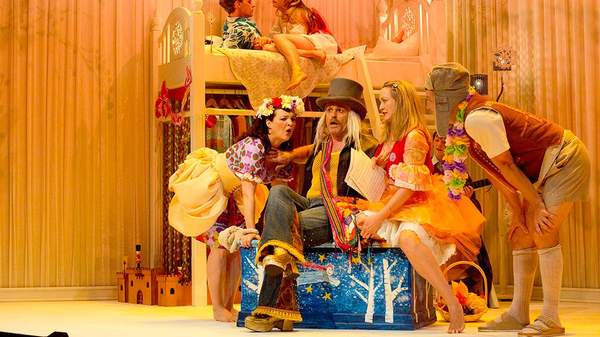Overview
One of Shakespeare’s later works, The Winter’s Tale is a “problem play” for its disparity between tragedy and comedy, oscillating from one to the other like the debate on Climate Change. However, director John Bell's interpretation happily and deliberately doesn’t foreground logic as a primary function of storytelling.
The play starts in the tragic, dramatic mode: King Leontes (Myles Pollard) falls prey to an irrational jealous rage and accuses his pregnant wife, Queen Hermione (Helen Thomson), of philandering with his best friend, King of Bohemia Polixenes (Dorian Nkono). Then, despite the good counsel of his suited-up advisors, Leontes gets Camillo (Philip Dodd) to kill his best friend (but instead they escape to Bohemia), banishes his wife to prison and orders the abandonment of his new born “bastard” daughter. All this high drama causes his son, Prince Mamillius (alternating nights, Rory Potter and Otis Pavlovic) to die offstage of stress and grief.
Then in the second half of the play, the King returns to his senses and it turns into a comedy. His daughter shows up after 16 years of having been brought up as a Bohemian shepherdess, marries her father’s best friend’s son, the Prince of Bohemia, and the Queen is resurrected from a statue and forgives her husband and it all ends happily ever after.
This surreal plot is brought together cleverly if a little heavy handedly by director John Bell, who frames the story from the perspective of the King’s son, Mamillius. Taking place in the prince’s bedroom a beautifully crafted set with a bunk bed, toy chest and ceiling mobile that casts magical shadows across the softly draped walls Mamillius watches (or perhaps imagines) his father and the relationship between his parents disintegrate. After his own death of a broken heart, he remains present on stage and takes matters into his own hands to orchestrate a reconciliation and return to peace. The setting and storybook aesthetic either suggests The Winter’s Tale is simply the make-believe of a disillusioned little prince, or an interpreted series of events as seen through the whimsical (or disturbed) imagination of a child.
The performances are captivating, with special mention to Michelle Doake, who brings equal measures of strength, vitality and humour to the role of Paulina. Myles Pollard shows off versatility as the brooding, maddened King alongside the dumbed-up Shepherd. Helen Thompson plays a strong and (literally) statuesque Hermione.
The Winter’s Tale explores some of Shakespeare’s favourite themes: truth, power and the emotional effects of psychological irrationality. On the contemporary stage, Bell has translated these themes through the prism of domestic drama as seen by an implicated child. This interpretation helps us to accept the disparate tonal changes as products of an active imagination to see momentarily through the eyes of a child. And that’s never a bad thing.
Image by Michele Mossop.
Information
When
Saturday, March 1, 2014 - Saturday, March 29, 2014
Saturday, March 1 - Saturday, March 29, 2014
Where
Playhouse, Sydney Opera HouseBennelong Point
Sydney
